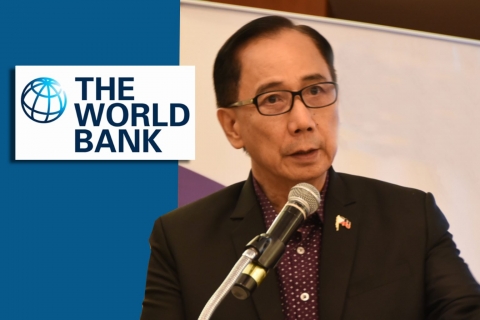Agriculture Secretary William D. Dar
By Secretary William D. Dar, Department of Agriculture
1. It is my distinct honor and privilege to virtually join you today as we launch the World Bank’s “Transforming Philippine Agriculture: During COVID-19 and Beyond.”
2. At this juncture of our history when the world battles a pandemic — that has not only claimed millions of lives, but is also paralyzing social and economic activities — I cannot overemphasize the need for all of us in the agriculture and rural development sector to unite and keep agriculture going to ensure nutritious and affordable food for our people and increased incomes for our farmers and fishers.
3. In fact, even before the pandemic, the country’s farming and fisheries sector has been in a “critical” stage, as shown by its erratic growth in previous decades. There is low farm productivity, lack of value-adding, as well as very few alternative sources of income not related to farming and fishing. The Philippine Statistics Authority said the country’s rural poverty incidence remains high, at 30 percent.
4. With the advent of climate change, increased global competition, and Covid-19 pandemic, the more Filipino farmers, fisherfolk and agripreneurs become most vulnerable, making them less food-secure and less able to compete.
5. The magnitude of our responses must therefore match the scale of these challenges. They should be comprehensive, science-based, inclusive and innovative to allow us to build efficient and resilient food production and distribution systems to feed our growing population, now and in the future.
6. The message of this Report is clear: The transformation of Philippine agriculture into a dynamic, high-growth sector is essential for the country. It is the surest way if we are to speed up our economic recovery from the pandemic and achieve a meaningful poverty-reduction and inclusive growth.
7. We are thankful that despite the social paralysis and economic slowdown the pandemic has wrought, the agriculture sector remains resilient, even growing a quite surprising 1.6 percent in the second quarter.
8. We give due credit to the DA’s “Plant, Plant, Plant” program and our “Survive, Reboot, and Grow” strategy, which — since the start of the community quarantine — have been part of the DA’s “Food Security Development Framework” and way forward under the “new normal.”
9. We are pleased to share with you some accomplishments, as of September 1, 2020, under the Plant, Plant, Plant Program, which has become the DA’s umbrella program:
To boost productivity:
- · Delivered inbred and hybrid rice seeds to 1.22 million farmers, collectively tilling 1.6 million hectares, under the Rice Resiliency Project;
- · Distributed seeds, planting materials and animals to 855,324 individuals and households, 13 provincial LGUs, 481 city and municipal LGUs, 64 communities and schools and 47 farmers’ group under our urban and community agriculture program;
To boost income:
- · Facilitated the direct procurement of 442 LGUs for various food and agricultural products, valued at P2.6 billion;
To enhance food access:
- · Served 1.96 million households, 23,294 farmers and fisherfolk, and 4,453 agri-fishery cooperatives and associations nationwide under our “Kadiwa ni Ani at Kita” marketing program, selling P6-billion worth agri-fishery product; and
To provide social protection and amelioration:
- · Released P1.06 billion to 42,299 marginal, small farmers and fishers from 49 provinces; and P731 million to 108 micro and small enterprises from Metro Manila and 46 provinces, under the expanded SURE Aid and recovery program.
We also gave out P6 B in financial assistance to 1.2 million small rice farmers.
10. As we continue our struggle against the pandemic, we can no longer go back to the old “business as usual” mode.
Instead, we have to focus our efforts on the three principal strategies of the Plant, Plant, Plant program as we journey into the new normal, namely: survive, reboot, and grow.
11. We will follow the path laid out by our “new thinking for Philippine agriculture,” guided by the following eight paradigms:
- · Agricultural modernization;
- · Industrialization;
- · Farm and fishery consolidation and clustering;
- · Systematic and strategic export development;
- · Strengthening rural infrastructure program;
- · Higher DA budget and public-private sector investments;
- · Cooperation with the legislative branch; and
- · Roadmap development.
12. Our goal is a country that is food-secure and resilient, where farmers and fisherfolk are empowered and enjoy better incomes and a higher standard of living.
That is why we are working doubly hard to empower our farmers, fisherfolk, and agripreneurs to raise their agricultural productivity and profitability, while ensuring greater sustainability and resilience from disasters, climate change impacts, and pandemics.
13. We at the DA therefore express our utmost gratitude to the World Bank, particularly to the team that labored to complete this Report.
14. We are confident that this document will provide the DA, as well as other agents and champions of rural development, with valuable lessons and comprehensive analysis of the Plant, Plant, Plant program and related interventions and initiatives to sustain the growth, modernization and industrialization of Philippine agriculture.
15. We hope the World Bank will continue to support our future endeavors, in addition to the ongoing the Philippine Rural Development Project (PRDP) that has become one of the best examples of successful multi-sectoral, multi-level partnerships.
On behalf of President Rodrigo Roa Duterte and the Filipino people, thank you World Bank and more power!
Mabuhay!

